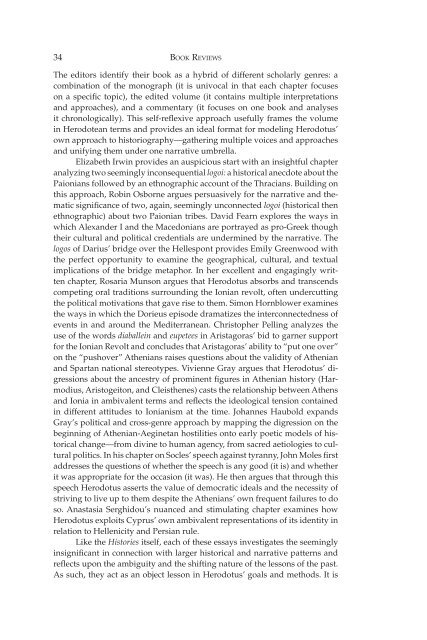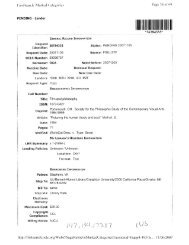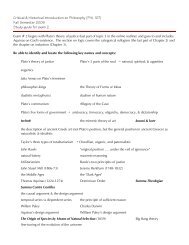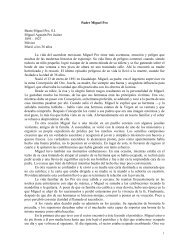The classical bulletin - Creighton University BSCW
The classical bulletin - Creighton University BSCW
The classical bulletin - Creighton University BSCW
Create successful ePaper yourself
Turn your PDF publications into a flip-book with our unique Google optimized e-Paper software.
34 book Reviews<br />
<strong>The</strong> editors identify their book as a hybrid of different scholarly genres: a<br />
combination of the monograph (it is univocal in that each chapter focuses<br />
on a specific topic), the edited volume (it contains multiple interpretations<br />
and approaches), and a commentary (it focuses on one book and analyses<br />
it chronologically). This self-reflexive approach usefully frames the volume<br />
in Herodotean terms and provides an ideal format for modeling Herodotus’<br />
own approach to historiography—gathering multiple voices and approaches<br />
and unifying them under one narrative umbrella.<br />
Elizabeth Irwin provides an auspicious start with an insightful chapter<br />
analyzing two seemingly inconsequential logoi: a historical anecdote about the<br />
Paionians followed by an ethnographic account of the Thracians. Building on<br />
this approach, Robin Osborne argues persuasively for the narrative and thematic<br />
significance of two, again, seemingly unconnected logoi (historical then<br />
ethnographic) about two Paionian tribes. David Fearn explores the ways in<br />
which Alexander I and the Macedonians are portrayed as pro-Greek though<br />
their cultural and political credentials are undermined by the narrative. <strong>The</strong><br />
logos of Darius’ bridge over the Hellespont provides Emily Greenwood with<br />
the perfect opportunity to examine the geographical, cultural, and textual<br />
implications of the bridge metaphor. In her excellent and engagingly written<br />
chapter, Rosaria Munson argues that Herodotus absorbs and transcends<br />
competing oral traditions surrounding the Ionian revolt, often undercutting<br />
the political motivations that gave rise to them. Simon Hornblower examines<br />
the ways in which the Dorieus episode dramatizes the interconnectedness of<br />
events in and around the Mediterranean. Christopher Pelling analyzes the<br />
use of the words diaballein and eupetees in Aristagoras’ bid to garner support<br />
for the Ionian Revolt and concludes that Aristagoras’ ability to “put one over”<br />
on the “pushover” Athenians raises questions about the validity of Athenian<br />
and Spartan national stereotypes. Vivienne Gray argues that Herodotus’ digressions<br />
about the ancestry of prominent figures in Athenian history (Harmodius,<br />
Aristogeiton, and Cleisthenes) casts the relationship between Athens<br />
and Ionia in ambivalent terms and reflects the ideological tension contained<br />
in different attitudes to Ionianism at the time. Johannes Haubold expands<br />
Gray’s political and cross-genre approach by mapping the digression on the<br />
beginning of Athenian-Aeginetan hostilities onto early poetic models of historical<br />
change—from divine to human agency, from sacred aetiologies to cultural<br />
politics. In his chapter on Socles’ speech against tyranny, John Moles first<br />
addresses the questions of whether the speech is any good (it is) and whether<br />
it was appropriate for the occasion (it was). He then argues that through this<br />
speech Herodotus asserts the value of democratic ideals and the necessity of<br />
striving to live up to them despite the Athenians’ own frequent failures to do<br />
so. Anastasia Serghidou’s nuanced and stimulating chapter examines how<br />
Herodotus exploits Cyprus’ own ambivalent representations of its identity in<br />
relation to Hellenicity and Persian rule.<br />
Like the Histories itself, each of these essays investigates the seemingly<br />
insignificant in connection with larger historical and narrative patterns and<br />
reflects upon the ambiguity and the shifting nature of the lessons of the past.<br />
As such, they act as an object lesson in Herodotus’ goals and methods. It is





